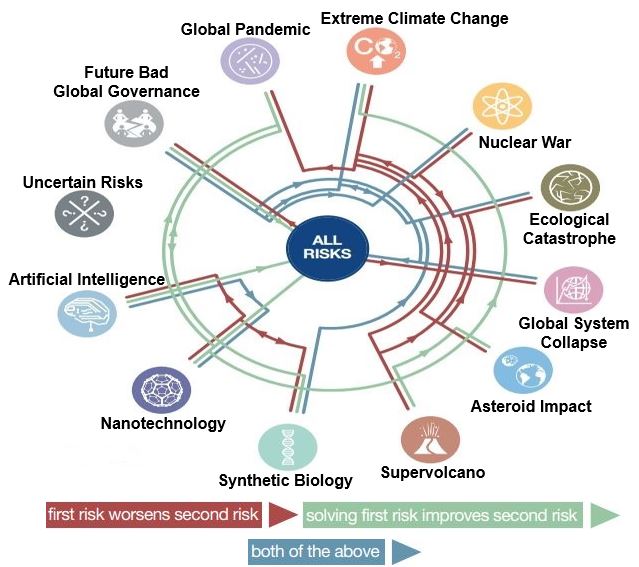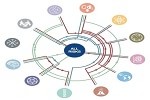A report has listed the twelve greatest global risks that could kill off humans, ranging from an asteroid collision, nuclear war, a global pandemic, to a catastrophic volcanic eruption.
The Global Challenges Foundation together with the University of Oxford’s Future of Humanity Institute have narrowed down the number of possible ways the world could end to twelve.
While many of the catastrophes, such as the eruption of a supervolcano or an asteroid impact are beyond our control, others including extreme climate change and out-of-control artificial intelligence could be the result of human activity.
The authors of “12 Risks that threaten human civilization” (citation below) claim their report is the first to create a list of global risks with impacts that can be called infinite.

The risks are interconnected in different ways. Often the situation is like one of several dominoes: if one falls, many follow. Even small impacts can start a process where different risks interact. (Image Source: Global Challenges Foundation)
“It (the Report) is also the first structured overview of key events related to such risks and has tried to provide initial rough quantifications for the probabilities of these impacts.”
They say their aim is to inspire action and dialogue, and also increased usage of the methodologies used for assessing risk.
“The idea that we face a number of global risks threatening the very basis of our civilisation at the beginning of the 21st century is well accepted in the scientific community, and is studied at a number of leading universities. But there is still no coordinated approach to address this group of risks and turn them into opportunities,” the authors wrote.
They have separated the risks into four categories:
1. Current Risks: a) Extreme Climate Change. b) Nuclear War. c) Ecological Catastrophe. d) Global Pandemic. e) Global System Collapse.
2. Exogenic Risks: These are risks that are formed or occur on the surface of the Earth. a) Major Asteroid Collision. b) Supervolcano.
3. Emerging Risks: a) Synthetic Biology. b) Nanotechnology. c) Artificial Intelligence. d) Uncertain Risks.
4. Global Policy Risk: Future Bad Global Governance.
In the Executive Summary of the Report, the authors wrote:
“The idea that we face a number of global challenges threatening the very basis of our civilization at the beginning of the 21st century is well accepted in the scientific community, and is studied at a number of leading universities. I But there is still no coordinated approach to address this group of challenges and turn them into opportunities.
Citation: “12 Risks that threaten human civilization,” Global Challenges Foundation and the University of Oxford.

